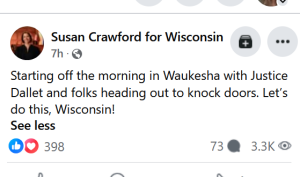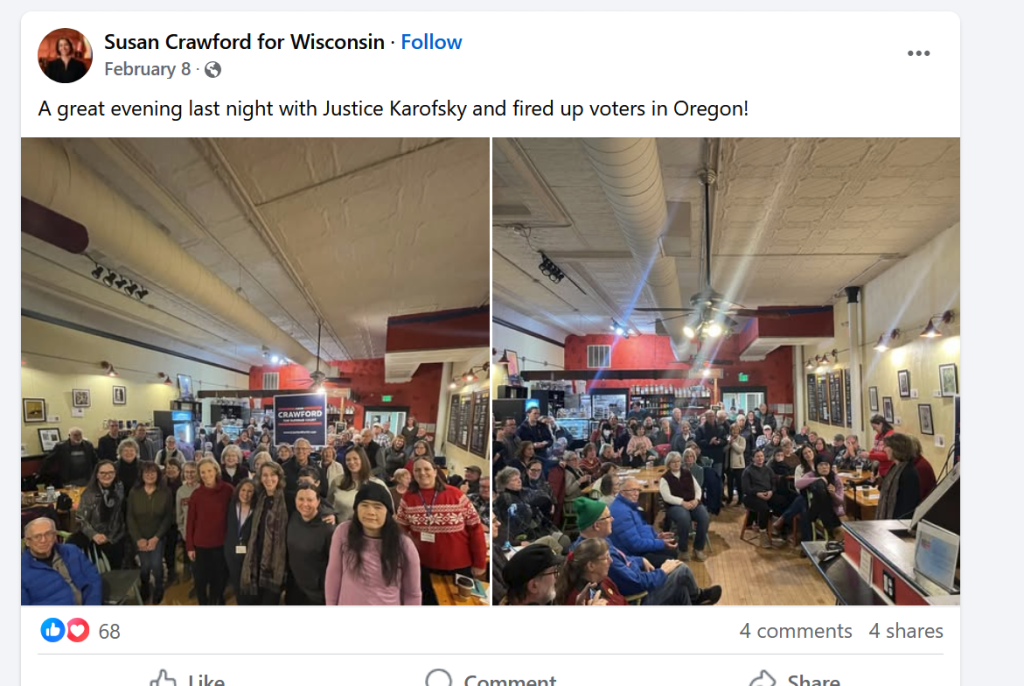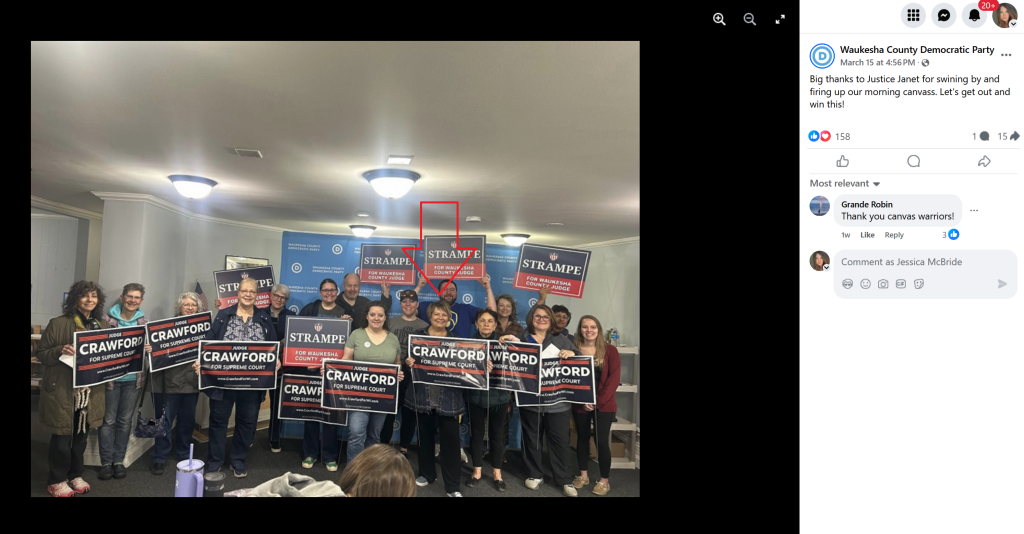A Wisconsin appeals court has shot down Democratic Attorney General Josh Kaul’s legal action against Tesla CEO Elon Musk, saying that Kaul has failed to show that he is “entitled to any form of relief.”
The judges on the appellate panel are Democrats. One was appointed by Democratic Gov. Tony Evers.
The ruling could get appealed to the state Supreme Court. The liberal justices have endorsed liberal Supreme Court candidate Susan Crawford, raising concerns about conflicts of interest. For example, liberal Justice Rebecca Dallet was door knocking for Crawford’s campaign on March 29, 2025, according to Crawford’s campaign website.


Liberal Justice Jill Karofsky has also hit the campaign trail for Crawford.
 Liberal Justice Janet Protasiewicz has also campaigned for Crawford.
Liberal Justice Janet Protasiewicz has also campaigned for Crawford.
 Kaul is trying to get a court to prevent Musk from holding a town hall on Sunday in Green Bay, Wisconsin, with signers of a generic petition opposing activist judges. Musk also plans to give two petition signers $1 million each.
Kaul is trying to get a court to prevent Musk from holding a town hall on Sunday in Green Bay, Wisconsin, with signers of a generic petition opposing activist judges. Musk also plans to give two petition signers $1 million each.
“Wisconsin Attorney General Josh Kaul petitions for a supervisory writ, and also moves for emergency temporary relief in the form of an order barring respondents Elon Musk and America PAC from taking certain actions. Unlike the circuit courts and Wisconsin Supreme Court, this court’s writ jurisdiction is limited to our supervisory authority over circuit courts. We conclude that the petition fails to show that the Attorney General is entitled to any form of relief that this court is permitted to provide,” the appeals court wrote on March 29, 2025.
Thus, the court ruled, it was denying Kaul’s petition.
Kaul is a liberal Democrat; Musk is supporting former Attorney General Brad Schimel’s quest for a seat on the state Supreme Court. The other candidate is liberal Susan Crawford.
“The petition alleges that on Friday, March 28, 2025, the Attorney General filed a
complaint in the circuit court naming Musk and America PAC as defendants,” says the decision.
The complaint alleged conduct that, quoting the complaint, “demonstrates an intention to violate” WIS. STAT. § 12.11, which prohibits various forms of election bribery. The petition alleged that thepayments in question are set to occur on Sunday, March 30, 2025.
This is a reference to an earlier Musk tweet about a town hall in which he planned to gift two Wisconsin voters $1 million each. However, Musk later clarified that, and said he was giving the money to people who sign his petition against activist judges. That’s not illegal.
Fond du Lac County DA Eric Toney, a Republican who ran against Kaul for Attorney General, has called Kaul’s legal action against Musk “nonsensical” as a result of Musk’s clarification.

“The Attorney General also moved the circuit court for an ex parte temporary restraining order by the close of business that day,” the court wrote.
The circuit court refused to hear the motion before Musk’s Green Bay town hall. Thus, Kaul appealed to the higher court.
Kaul’s “petition does not provide any details about an alleged refusal, such as the manner in which any refusal was communicated to the petitioner or any reasoning that the court provided. And, the petition does not allege that the circuit court denied the motion,’ the court wrote.
“Unlike the circuit court or the supreme court, this court has original jurisdiction to hear a
petition for a writ only if the petition is related to our supervisory or appellate authority over circuit courts,” the court wrote.
“Due to this limitation, this court lacks original jurisdiction to decide, in the first instance, the underlying merits of the complaint that was filed in the circuit court. In other words, we are not permitted to be the first court to decide whether the respondents are engaged in the conduct that is alleged, or to decide the legal status of that conduct. This means that we do not have writ jurisdiction to require or prohibit any specific action by respondents Musk or America PAC. Our writ jurisdiction is limited to requiring or prohibiting action by the circuit court.”
Noted the appeals court: “Our focus is on whether the circuit court has violated a plain duty. The petitioner’s only allegation of a violation of a plain duty by the circuit court appears to be that court’s alleged refusal to act on the motion for a restraining order filed by the Attorney General. If we were to conclude that the circuit court violated such a duty, the mostly likely form of relief that would be appropriate would be to order the circuit court to hear the motion. However, the petition does not ask for this relief.”
The court added: “We conclude, based on the facts alleged in the petition to this court, and in light of the petition’s minimally developed legal argument showing how these facts satisfy the plain-duty element, that the petitioner has not shown that the circuit court had a plain duty to proceed on the Attorney General’s motion for a restraining order before Sunday, March 30, 2025.”
The case was before judges Kloppenburg, P.J., Blanchard, and Graham, JJ.

















![WATCH: Elon Musk Town Hall Rally in Green Bay [FULL Video]](https://www.wisconsinrightnow.com/wp-content/uploads/2022/04/Elon_Musk_3018710552-356x220.jpg)



![The Wisconsin DOJ’s ‘Unlawful’ Lawman [WRN Voices] josh kaul](https://www.wisconsinrightnow.com/wp-content/uploads/2025/03/MixCollage-29-Mar-2025-08-48-PM-2468-356x220.jpg)












